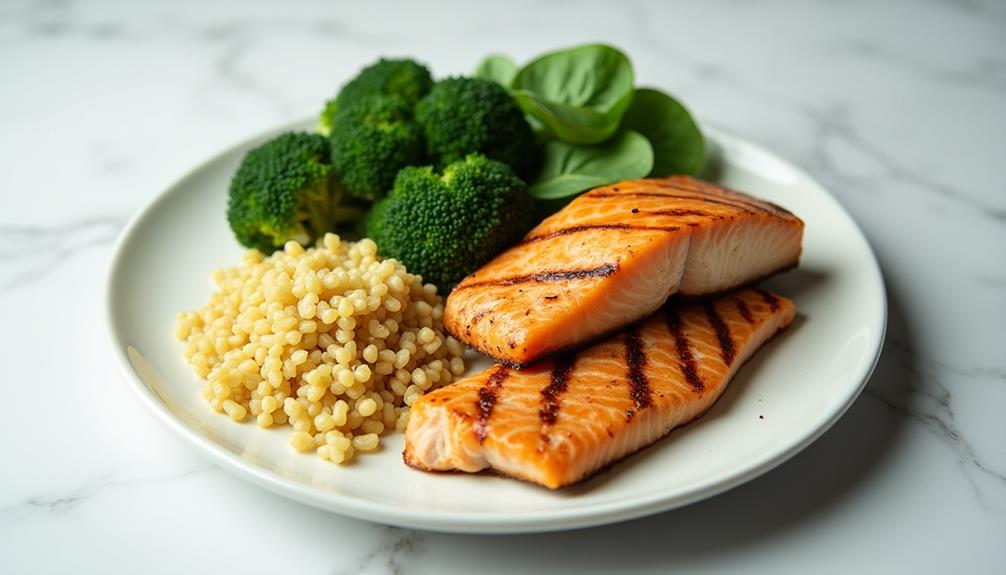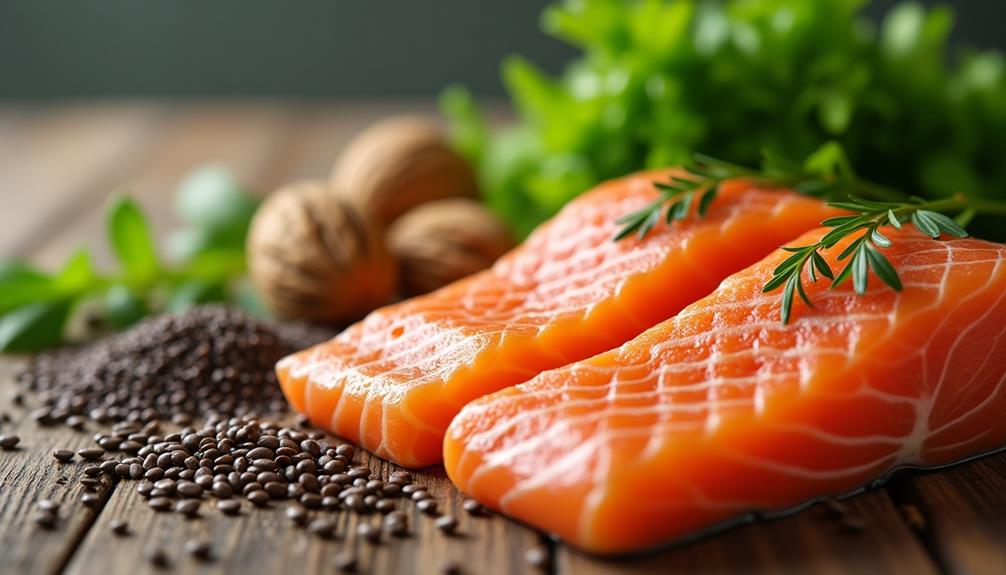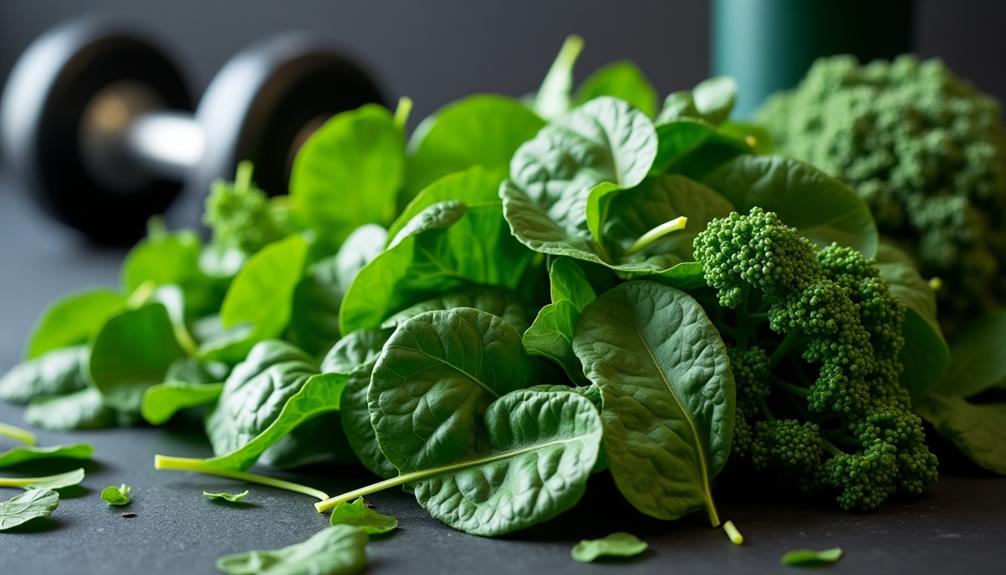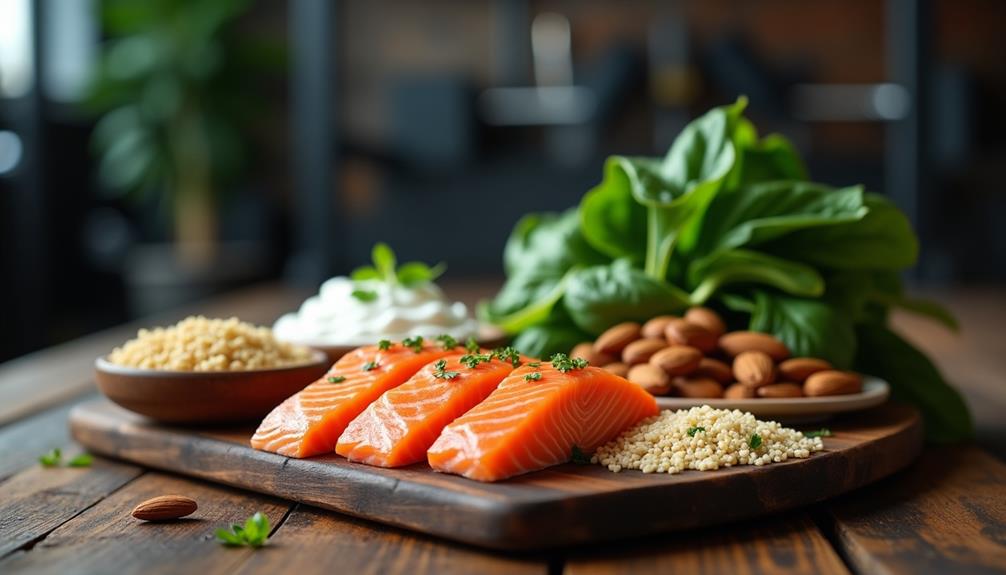To boost muscle repair, here are five essential foods every bodybuilder needs. First, include lean proteins like chicken or fish, as they provide amino acids crucial for muscle recovery. Next, prioritize omega-3 fatty acids found in fatty fish and walnuts, which help reduce inflammation and support tissue building. Don't forget antioxidant-rich fruits such as berries and citrus, which aid in healing. Incorporate whole grains for sustained energy and effective nutrient absorption. Finally, add leafy green vegetables for essential vitamins and minerals that enhance overall function. For more insights on optimizing your diet, stick around.
Core Insights
- Lean proteins like chicken, fish, and legumes provide essential amino acids crucial for muscle recovery after intense workouts.
- Omega-3 fatty acids from sources like fatty fish and walnuts help reduce inflammation and support muscle protein synthesis.
- Antioxidant-rich fruits, such as berries and citrus, aid in muscle recovery by combating oxidative stress and promoting collagen production.
- Whole grains offer complex carbohydrates for sustained energy, fiber for digestion, and essential B vitamins for energy metabolism.
- Leafy green vegetables are packed with vitamins and minerals that support muscle function, bone health, and reduce inflammation.
Lean Proteins

When it comes to muscle repair, incorporating lean proteins into your diet can make all the difference. Lean proteins, such as chicken breast, turkey, fish, and legumes, provide essential amino acids that your muscles need to recover after workouts. These proteins help repair damaged tissues and build new muscle fibers. Protein powders can also be an excellent source of lean protein, offering 20-30g per serving and often including BCAAs for ideal muscle recovery.
Including lean proteins in your meals can enhance your recovery time and improve overall performance. Aim for a protein source in every meal or snack, especially after your workouts. You can easily mix grilled chicken into salads or enjoy a protein shake post-exercise. By consistently fueling your body with these nutrient-rich options, you'll support your muscle repair process effectively and set yourself up for success in your bodybuilding journey.
Omega-3 Fatty Acids

Omega-3 fatty acids play a pivotal role in your muscle repair and recovery. These healthy fats help reduce inflammation, which is crucial after intense workouts. By lowering inflammation, omega-3s enable your muscles to recover faster and more effectively. Similar to vegan collagen boosters, omega-3s support overall skin health and can contribute to a radiant complexion, benefiting both your muscles and appearance.
Incorporating omega-3s into your diet can also enhance protein synthesis. This process is vital for building new muscle tissue. You can find these beneficial fats in foods like fatty fish, flaxseeds, and walnuts.
Adding omega-3-rich foods to your meals isn't complicated. Consider grilled salmon for dinner or a smoothie with flaxseed. By prioritizing omega-3s, you're supporting your body's recovery journey, ensuring you're ready for your next training session.
Antioxidant-Rich Fruits

Incorporating these fruits into your diet supports your body's natural repair processes. Berries, for example, contain anthocyanins, which have been shown to aid muscle recovery. Citrus fruits provide vitamin C, essential for collagen production and tissue repair. While fruits are beneficial, herbal teas can also contribute to muscle relaxation and recovery. Aim to include a variety of these fruits in your meals and snacks, ensuring you're fueling your body effectively for best recovery.
Whole Grains

Fruits aren't the only foods that can enhance your recovery; whole grains also play an important role in muscle repair. They provide essential nutrients that help replenish energy stores and support muscle recovery after intense workouts. Here are four key benefits of including whole grains in your diet:
- Complex Carbohydrates: They supply sustained energy, vital for your training and recovery.
- Fiber: Whole grains help maintain digestive health, which is crucial for nutrient absorption.
- B Vitamins: These vitamins play a role in energy metabolism and support red blood cell production.
- Minerals: Whole grains are rich in magnesium and iron, essential for muscle function and recovery.
Incorporating whole grains into your meals can greatly enhance your muscle repair process.
Leafy Green Vegetables

Packed with vitamins and minerals, leafy green vegetables are a powerhouse for muscle repair and overall recovery. They provide essential nutrients like vitamin K, calcium, and magnesium, which support muscle function and bone health. Including spinach, kale, and Swiss chard in your meals can enhance your nutrient intake.
These greens are also rich in antioxidants, which help reduce inflammation and oxidative stress after intense workouts. To maximize their benefits, try adding them to smoothies, salads, or stir-fries.
Not only do leafy greens support muscle recovery, but they also promote overall health, boosting your immune system and energy levels. By including them in your diet, you're taking an essential step toward peak performance and recovery.
Frequently Asked Questions
How Quickly Should I Consume These Foods After a Workout?
Studies show consuming protein within 30 minutes post-workout can boost muscle recovery by up to 50%. So, grab those muscle repair foods right after your session to maximize gains and help your body recover faster.
Can I Substitute One Food for Another in These Categories?
Yes, you can substitute one food for another in these categories. Just make sure the substitutes offer similar nutrients and benefits. Listen to your body's needs and adjust your intake accordingly for best recovery.
Are There Any Supplements That Can Replace These Muscle Repair Foods?
You can use supplements like protein powder, BCAAs, or creatine to support muscle repair. However, it's best to complement these with whole foods for peak recovery and overall health. Balance is key in your diet.
How Do These Foods Affect Muscle Soreness Levels?
Studies show that 70% of athletes experience muscle soreness. These foods help reduce inflammation and speed recovery, so you'll feel less soreness after workouts. Incorporating them into your diet can enhance your overall performance and comfort.
What Is the Ideal Portion Size for Muscle Repair Foods?
When it comes to muscle repair foods, you should aim for balanced portion sizes that include protein, healthy fats, and carbohydrates. Generally, 20-30 grams of protein per meal promotes ideal recovery without overloading your system.

